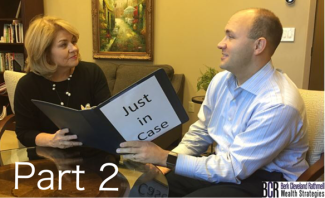
What to do When You Lose a Spouse
Losing a spouse is probably the most dreaded moment in life. Grieving is hard enough, and it is even more difficult if you are overwhelmed by of all the “business” that must be managed in the aftermath. It’s best to be prepared when it happens, so if you are fortunate enough to have your spouse with you still, read this article for information on how to prepare in advance; however, if you are a new widow or widower, here is some information on what to do when your spouse dies.
1. Be willing to accept the help, for everyone’s sake.
This may be the most important thing you can do when you’ve lost your spouse. Many people tend to withdraw from others after such a loss. They don't want to be a burden to other people, so they do everything they can to avoid asking for assistance, which isn’t the best approach for three reasons:
- First, a grieving mind is not always in the best condition to pay close attention to details, which could result in decisions that may be less than the best.
- Second, your withdrawal is more of a burden to your loved ones than helping you would be. Anyone who loves you will be grieving right along with you. Helping you would help them process their own grief, so you can ease their suffering, as well as yours, by accepting their help.
- Third, having a support system around you will help you avoid entering into depression, which is common after the death of a spouse.
2. Round up the documents you need, and decide which of your loved ones will help you with each item on your to-do list.
See this article for the full list of documents you need to locate. Think about who you want to assist you with each item. If you have a plan and people designated to help you execute it as smoothly as possible on the front end, there will be less clean-up work to be done later.
3. Execute the actions on the to-do list below.
There are many things that must be done in a certain order, so take first things first and don’t try to do everything all at once. It will take months to get everything accomplished, so don’t rush – take one step at a time.
A post-mortem to-do list
First Actions
- Contact your family and friends.
- Contact the funeral director, and ask him/her to order at least eight copies of the death certificate.
- Contact your wealth manager/financial advisor.
- Contact the decedent’s co-workers and friends (a list of them is part of the “just in case” documents we recommend compiling in this article).
- Contact the life insurance company.
Soon after the Funeral/Memorial Service
- Take inventory of the balances in current accounts (banks, cash accounts, etc.)
- Make a list of bills to be paid, and pay when required.
- If you are unable to pay all the bills at this time, arrange payment plans.
- Follow up with the life insurance company if payment is not received within the time frame specified by the policy.
- Meet with the estate executor and attorney. Determine if probate is required and make sure you understand what actions you are authorized to take now.
As Soon as Possible
- Call contacts for all other insurance (business, disability, long-term care, etc.). Determine what your options are; file any claim that can be filed, and cancel policies for which a claim cannot be filed.
- Meet with your accountant to determine what filings are required now and what information you need for your next tax return.
- Review the status of credit accounts. Decide which credit cards you want to keep and cancel the rest.
- Change beneficiaries on any insurance policy or retirement account on which your spouse was the beneficiary.
- Transfer your spouse’s IRA.
- Change the names on property deeds and titles, including vehicles.
- Contact the Social Security Administration to see if you are eligible for benefits as a surviving spouse.
- Review any medical expenses and ensure they are paid as expected.
- Notify each of the three major credit bureaus.
As Needed
- Contact the decedent’s business partners/associates to determine how to handle any unfinished business.
- Determine any value you expect to receive from any business interests.
- Decide what to do with the decedent’s personal property.
You may feel overwhelmed after reading this list. Please seek help from people who are experienced in guiding you and assisting you through this process. You don’t have to go through it alone. There are competent and caring professionals who can lighten your load and give you peace of mind during the process and help avoid regrets in the end.

